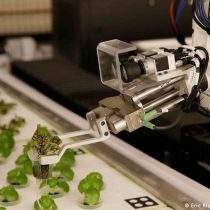
Physicists are the professionals who have the lowest risk of being replaced in the near future by machines, while butchers and meat packers face the greatest risk, according to a method that measures the risk of a profession being robotized.
The method has been developed by a team of Swiss scientists, which reveals that artificial intelligence is not the only threat to human employment, as physical jobs can also be performed more and more by robots.
The authors created an algorithm that predicts the level of automation risk of hundreds of jobs and suggests transition alternatives with minimal training effort, which is accessible, only in English, here.
Screenshot of the website where the authors presented their results.
Beyond artificial intelligence
In a study published on Wednesday (13.04.2022) by the team, made up of robotics specialists from the École Polytechnique Fédérale de Lausanne (EPFL) and the University of Lausanne, a new way of seeing the impact of robotization on employment is proposed by moving away from classical analyses, which concentrate on robotic programs based on artificial intelligence.
These include voice and image recognition, financial consulting or chatbots, which are applications that are usually used in customer service to offer automated answers to doubts or frequently asked questions.
“Instead, we don’t just consider computer applications, but robots that can perform physical work,” explained Dario Floreano, director of EPFL’s Intelligent Systems Laboratory.
Poultry meat is processed in the production halls of the poultry producer Wiesenhof in Lohne.
Cross-analysis
For their prediction, the researchers took into consideration documentation from the European Commission that describes dozens of skills that are required of current and future robots, such as manipulation, perception, sensation and interaction with humans.
Patents and descriptions of state-of-the-art robots were also analyzed.
When that information was crossed with the knowledge and skill to perform around 1,000 jobs it could be determined that jobs that require a person to work doing movements with a level of precision of one millimeter can be performed without difficulties by a robot.
“If the job requires that skill, it is more likely to be automated than professions that require critical and creative thinking,” the study concludes.
"El reclamo puede ser genuino, pero construido sobre una mentira", apuntó el presidente Javier Milei…
El gobernador de la provincia de Buenos Aires, Axel Kicillof, encabezó un acto en Ensenada…
El diputado nacional de La Libertad Avanza, José Luis Espert, expresó su confianza en la…
Tras la masiva reaparición de Cristina Fernández de Kirchner, el presidente Javier Milei apuntó contra…
El principal propósito de la nueva comisión es evaluar los recursos humanos en el Senado,…
En una medida que busca redefinir las condiciones de los seguros de automóviles en Argentina,…
Esta web usa cookies.